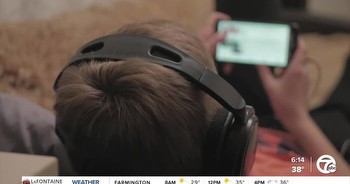Experts Say Increased Access to Online Gambling May Put Teens at Risk

Home/Featured Content/Experts Say Increased Access to Online Gambling May Put Teens at Risk
As young people increasingly have access and exposure to online gambling, only one in four parents say they have talked to their teen about some aspect of virtual betting, a national poll suggests.
But over half of parents aren’t aware of their state’s legal age for online gambling and one in six admit they probably wouldn’t know if their child was betting online, according to the University of Michigan Health C.S. Mott Children’s Hospital National Poll on Children’s Health.
“Teens and young adults may have a difficult time going into a casino unnoticed but they have easy access to a variety of betting and gambling options,” said Mott Poll co-director Sarah Clark, M.P.H.
“This expanded accessibility has increased exposure to the risks of underage betting, but there is little regulation or conversation around this problem.”
Online gambling more accessible than ever
Since a landmark 2018 United States Supreme Court ruling, over half of states have legalized some type of online gambling.
Although most states restrict online sport and casino betting to 21 years or older, there are loopholes and concerns that adolescents and teens may bypass security measures.
Online sports betting is similar to fantasy football leagues and college basketball tournament pools that are popular with sports fans, including high schoolers and even younger kids, Clark says.
“Many online gambling options will seem familiar to teens,” Clark said.
“They feel like games kids have been playing on their phones, including features like bonus points and rewards. That familiarity may make it harder for teens to appreciate the difference between playing for fun and playing for money.”
Yet, just 2% of parents polled believe that their teen has used an online betting platform, while more than half of parents felt they would definitely know if their teen has been betting online.
“Parents may be underestimating their teen’s interest and savviness,” Clark said.
“Online betting can be difficult to detect because a teen can easily log in on their smartphone or other personal device, delete the search history, hide the app or use it discretely.”
Additionally, two-thirds of parents reported their teen has a bank account or debit or credit card in their own name that could be used to register for online betting platforms.
This makes it even more possible, Clark notes, for teens to participate in online betting without their parents’ knowledge.
Kids commonly exposed to online gambling
A third of parents say that they or another adult in their household participate in online, in-person, or social betting, finds the nationally representative poll that’s based on responses from 923 parents with at least one child ages 14-18.
Another 63% say they have seen or heard ads for online sports or casino betting in the past year.
Whether or not the child is actually using betting platforms, ongoing discussions may help them navigate the social pressures and media presence of gambling platforms.
– Sarah Clark, M.P.H.
Young people who engage in fantasy sports or gaming apps intended for adults, may also be exposed to gambling advertisements.
Such ads often feature entertainers and sports figures that are popular with teens and young adults, Clark says, along with enticing bonuses, online social casino games and graphics encouraging continued use.
“Teens may be especially susceptible to these ads, which are often marketed to convey feelings of excitement, endless possibilities, and social credit,” Clark said.
Many parents worried about gambling risks
Two-thirds of parents think the legal age for online betting should be 21 years, while 22% say it should be between 18-20 years and 11% feel it shouldn’t be legal at any age.
Many parents also expressed concerns about youth risks, including going into debt or developing a gambling addiction as a result of online betting.
And the quarter of parents who have talked with their teen about some aspect of online betting commonly discussed these risks.
Some parents also support certain strategies they see as effective in minimizing the risks of online betting for youth or young adults.
These include restricting betting after a certain amount is lost, offering a “parent view” option to monitor online betting accounts, verifying legal age with photo identification to open an online betting account, limiting the amount that can be bet within a certain timeframe and paying treatment costs for youth or young adults who develop gambling addictions.
Clark encourages parents to address the topic with teens to help them understand the strategies used by gambling sites to lure people into betting more frequently and in larger amounts.
“The ubiquity of gambling ads may offer parents an opportunity to initiate open, productive conversations with their teen about the risks of gambling and its prevalence in their social circles,” Clark said.
“Whether or not the child is actually using betting platforms, ongoing discussions may help them navigate the social pressures and media presence of gambling platforms.”
Get medical tips from top experts and learn about new scientific discoveries every week by subscribing to Health Lab’s two newsletters, Health & Wellness and Research & Innovation.
—
***
You Might Also Like These From The Good Men Project
Join The Good Men Project as a Premium Member today.
All Premium Members get to view The Good Men Project with NO ADS. A $50 annual membership gives you an all access pass. You can be a part of every call, group, class and community. A $25 annual membership gives you access to one class, one Social Interest group and our online communities. A $12 annual membership gives you access to our Friday calls with the publisher, our online community.






























